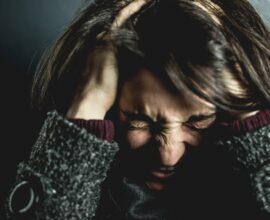Many people on earth aren’t aware of the significance of mental health. Mental health awareness is the continuing endeavor to minimize the stigma around mental illness and mental health conditions by sharing our personal experiences. Often, due to misconceptions regarding mental health and mental fitness, people suffer a lot in silence and their conditions remain untreated.
Concept of Depression
Usually, depression is known as a mood disorder. It can also be described as feelings of loss, dejection, or anger that interfere with the daily activities of an individual. Also, it has become fairly common nowadays. According to crucial data from the Centers for Disease Control and Prevention, nearly 18.5 percent of American adults had symptoms of depression in any given fortnight in 2019. It is imminent to have increased during the lockdown phase of the global pandemic.
Though there are some features common between depression and grief, conceptually they differ. If you lose someone close to you, then you feel grief or sadness. Whereas depression ideally leads to a loss of self-esteem, that grief necessarily doesn’t.
For any grief-stricken person, positive emotions and happy memories of the deceased usually accompany emotional feelings of pain. In major depressive disorder, the feelings of sadness are persistent.
People experience depression in various ways, interfering with their daily chores, causing lost time and reduced productivity. Additionally, it can adversely affect relationships and a few chronic health conditions.
Conditions that can worsen because of depression are as follows:
- cardiovascular disease
- diabetes
- Arthritis
- cancer
- asthma
- obesity
You must realize that feeling down sometimes is a part of normal life. Events that upset you and make you feel sad are very common and can happen to anyone. However, if you constantly feel low or hopeless, then it might be due to depression, which is a serious medical condition that can deteriorate if not treated properly.
Symptoms of Depression
Depression can be more than a constant mood of sadness. Major depression may lead to a plethora of symptoms. A few affect your mood adversely and others affect your body. Symptoms may also be constant or may come and go.
General Symptoms
Everyone with depression won’t experience the same symptoms. Symptoms can differ in seriousness, the way they happen, and how long they last. Whenever you experience a few of the following symptoms of depression almost daily for at least a fortnight, maybe you are living with depression:
- Excessive crying
- feeling worthless, hopeless, and pessimistic
- feeling anxious, sad, or empty
- loss of interest in hobbies and interests that you enjoyed once
- feeling angry, bothered, or frustrated
- contemplating self-harm, death, suicide, or suicide attempts
- difficulty focusing, remembering, or decision making
- moving or talking slower than usual
- decreased energy or fatigue
- appetite or weight changes
- chronic physical pain without any specific cause that doesn’t cure with any treatment of aches or pains, headaches, digestive issues, cramps, etc.
- sleeping disorder, early morning awakening, or oversleeping
Depression Causes
There are multiple possible causes of depression, ranging from biological to circumstantial.
The common causes are as follows-
- Early childhood trauma. A few events affect the way your body responds to fear and stressful situations.
- Family history. You could be at a higher risk for developing depression if there is a family history of depression or another mood disorder.
- Hormone levels. There could be alterations in female hormones progesterone and estrogen during various periods such as during the postpartum period, menstrual cycle, perimenopause, or menopause. They all increase the risks of depression.
- Brain chemistry. A chemical imbalance may occur in parts of the brain that regulate thoughts, mood, sleep, appetite, and behavior among depressed people.
- Brain structure. When the frontal lobe of your brain is less active, thenthere’ll be a higher risk for depression. But scientists aren’t sure whether this happens before or after the onset of depressive symptoms.
- Pain. People who are emotional and feel chronic physical pain for a long duration can be significantly more likely to develop depression.
- Medical conditions. Specific conditions may put you at higher risk, like chronic pain, chronic illness, insomnia, cardiac arrest, Parkinson’s disease, stroke, and cancer.
- Substance use. Any history of substance or alcohol misuse can increase your risk.
Risk Factors
The risk factors for depression can be social, medical, biochemical, genetic, or circumstantial. Common risk factors are as follows:
- Genetics. There’ll be an increased risk of depression due to a family history of it.
- Sex. The chances of major depression are double among females compared to males.
- Specific medications. Specific drugs including certain categories of corticosteroids, hormonal birth control, and beta-blockers may be linked with the increased risk of depression
- Socioeconomic status. Socioeconomic status, including financial challenges and perceived low social status, may intensify your risk of depression.
- Gender identity. The risk of depression for transgender people is almost 4-fold that of cisgender people.
- Vitamin D deficiency. Studies associate depressive symptoms with low levels of vitamin D.
- Medical illnesses. Depression is linked with other chronic ailments. People with heart disease are almost twice likely to feel depressed as people who don’t, while nearly 1 in 4 people with cancer may feel depressed too.
- Substance misuse. Nearly 21% of people with a substance use disorder experience depression as well.
Treatment for Depression
It’s possible to manage symptoms successfully with one form of treatment, or you may find that a combination of treatments works best. It’s common to blend medical treatments and lifestyle therapies.
Medications
Your healthcare professional may prescribe any one or more of the following:
- Selective serotonin reuptake inhibitors (SSRIs)
- Serotonin and norepinephrine reuptake inhibitors (SNRIs)
- Tricyclic and tetracyclic antidepressants
- Atypical antidepressants
- Noradrenaline and dopamine reuptake inhibitors (NDRIs)
- Monoamine oxidase inhibitors (MAOIs)
- N-methyl D-aspartate (NMDA) antagonists
- Psychotherapy
- Cognitive behavioral therapy (CBT)
- Dialectical behavior therapy (DBT)
- Psychodynamic therapy
- Light therapy
- Electroconvulsive therapy (ECT)
- Alternative therapies like Meditation and Acupuncture
Inference Depression is 100% curable if detected early. Mental health isn’t taboo anymore.




